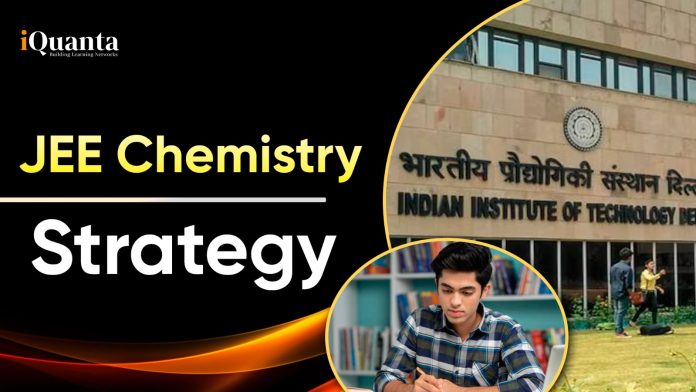JEE 2026 chemistry strategy: How to score high in Chemistry for JEE Main and Advanced. Preparing for JEE 2026 chemistry requires a well-planned approach focusing on key topics, concept clarity, and regular practice. With tough competition in JEE Main and JEE Advanced, mastering maths is essential for improving your overall rank. Chemistry is divided into major parts which include Organic Chemistry, Inorganic Chemistry and Physical Chemistry. Chemistry is one of the scoring sections in JEE Main as well as in JEE Advanced if candidates will comes with proper preparation strategy for Physical Chemistry, Organic Chemistry as well as Inorganic Chemistry.
The Physical Chemistry is a complete package of mastering mole concepts, chemical kinetics, thermodynamics, equilibrium, and more and to prepare it requires a proper understanding of concepts as well as formula derivation. The Inorganic Chemistry covers the trends of block according to the periodic table and its properties which covers the P-block, D-block and F-block elements and later covering the Organic Chemistry involves Hydrocarbons (Alkenes, Alkynes), Haloalkenes and Haloarenes, Alcohol, Phenol & Ethers as well as Aldehydes and Ketones. So all the major section of the JEE Main Chemistry requires a proper preparation strategy. In this blog, we will be covering the JEE Main Chemistry strategy across Physical Chemistry, Inorganic Chemistry and Organic Chemistry, priority topics as well as common mistakes to avoid during JEE Main Chemistry strategy as well as preparation tips.

JEE Main 2026 – A Brief Overview
The Joint Entrance Examination is further divided into JEE Main and JEE Advanced and the mode of examination is online where the total duration of the exam is 3 hours covering paper 1 and 3 hours 30 minutes for paper 2. The complete information about the JEE Main 2026 is mentioned in the table below in a detailed manner.
| Parameter | Details |
| Mode of Examination | Online (Computer-Based Test) except Drawing section (Offline) |
| Duration | 3 hours (Paper 1), 3 hours 30 minutes (Paper 2) |
| Shifts | First Shift: 9:00 AM – 12:00 Noon Second Shift: 3:00 PM – 6:30 PM |
| Type of Questions | – 20 MCQs per subject- 10 Numerical Value Questions per subject (attempt any 5) |
| Marking Scheme | +4 for correct answer -1 for incorrect answer (MCQs only) No penalty for unattempted questions |
JEE Main 2026 Exam Dates & Important Events (Expected)
| Event | Tentative Date (2026) |
| Release of Notification | November 2025 |
| Start of Online Registration | November – December 2025 |
| Last Date to Apply | January 2026 |
| Application Correction Window | Mid-January 2026 |
| Admit Card Release | 10–15 days before the exam |
| JEE Main 2026 Session 1 (January) | 3rd–4th week of January 2026 |
| JEE Main 2026 Session 2 (April) | 1st–2nd week of April 2026 |
| Answer Key Release | 1–2 weeks after each session |
| Result Declaration (Session 1) | February 2026 |
| Result Declaration (Session 2) | April 2026 |
| Counseling (JoSAA & CSAB) | June – July 2026 |
JEE 2026 Chemistry Strategy
The JEE Main Chemistry strategy for 2026 is divided into major sections including Physical Chemistry, Organic Chemistry and Inorganic Chemistry. It is advised to the candidates to start with the Physical Chemistry due to less syllabus and easy to cover but on the other hand, Organic chemistry covers important reactions and formulas that needs to practice or revise consistently. Although, Organic Chemistry is the major scoring part of the JEE Main Chemistry. Given below is the detailed JEE Chemistry strategy across Physical Chemistry, Thermodynamics & Electrochemistry, Organic Chemistry, Hydrocarbons & Functional Groups, Inorganic Chemistry as well as Chemical Bonding and Coordination Compounds.
| Section | Detailed Strategy |
| Physical Chemistry | – Master mole concept, stoichiometry, and concentration terms first. – Focus on derivations and formulae: Gibbs free energy, Nernst equation, Raoult’s law. – Solve ~50 numericals per topic (RC Mukherjee / coaching sheets). – Revise graphs: phase diagrams, conductance curves, adsorption isotherms. – Use NCERT + N Awasthi for solid practice. |
| Thermodynamics & Electrochemistry | – Understand system, surroundings, enthalpy, entropy concepts. – Focus on standard electrode potential, cell EMF, electrolysis basics. – Prepare a formula sheet (ΔG = -nFE, ΔH = U + PV). – Practice calorimetry, Hess’s law, and EMF calculation numericals. – Solve ~30 questions per subtopic. |
| Organic Chemistry | – Build strong GOC foundation: resonance, inductive, hyperconjugation, acidity/basicity trends. – Make reaction summary notes (name, mechanism, conditions). – Solve ~40-50 conversions and mechanism-based problems. – Practice stereochemistry, isomerism, and IUPAC naming. – Use NCERT + MS Chauhan for practice. |
| Hydrocarbons & Functional Groups | – Focus on alkane, alkene, alkyne, alcohol, aldehyde, ketone, amine reactions. – Understand tests (Tollens, Fehling, Lucas test) and reagents. – Solve multistep conversions and retrosynthesis questions. – Practice reaction mechanism flowcharts. – Attempt past JEE questions per functional group. |
| Inorganic Chemistry | – Read NCERT line by line, underline facts and exceptions. – Focus on periodic trends: size, ionization energy, electron affinity. – Prepare short notes/flashcards for p-block, d-block, metallurgy, qualitative analysis. – Revise coordination compounds (hybridization, crystal field theory). – Solve assertion-reason + factual PYQs. |
| Chemical Bonding & Coordination Compounds | – Focus on VSEPR, MO, and hybridization concepts. – Practice drawing Lewis structures and predicting shapes. – Understand crystal field splitting, color, and magnetic behavior. – Solve at least 20-30 standard coordination compound problems – Use NCERT + VK Jaiswal + coaching sheets. |
JEE 2026 Chemistry Strategy- iQuanta Coaching
iQuanta is considered as the top JEE coaching and the JEE chemistry strategy across sections is mentioned in the table below in a detailed manner. The section covers the Physical Chemistry, Organic Chemistry as well as Inorganic Chemistry.
| Section | iQuanta Coaching Strategy |
| Physical Chemistry | – Follow iQuanta video lectures for concept clarity (mole concept, thermodynamics, chemical kinetics). – Practice from iQuanta DPPs + test series regularly. – Maintain a formula notebook and revise after every module. – Solve previous years’ JEE PYQs after each topic is completed. |
| Organic Chemistry | – Attend iQuanta live classes for reaction mechanisms, GOC, and named reactions. – Make reaction flowcharts from class notes. – Solve iQuanta practice sheets for conversions and mechanisms. – Attempt weekly quizzes + doubt sessions to strengthen application skills. |
| Inorganic Chemistry | – Focus on NCERT-based iQuanta lectures (P-block, D-block, metallurgy). – Prepare summary notes from live classes, especially for exceptions and trends. – Revise periodic table trends weekly. – Practice factual MCQs and assertion-reason from iQuanta tests. |
| Practice Strategy | – Attempt iQuanta mixed topic tests every week.- Analyze mistakes through iQuanta performance reports. – Regularly clear doubts on the iQuanta Telegram group. – Allocate 60% practice time to weak areas based on test performance analysis. |
| Revision Strategy | – Use iQuanta rapid revision modules and cheat sheets before mock tests. – Revise NCERT Inorganic line by line in the final months. – Attempt past JEE PYQs + iQuanta grand tests. – Focus on time-bound problem solving to improve speed and accuracy before the exam. |
JEE 2026 Chemistry Strategy- Priority Topics
| Section | Priority Topics | Suggested Weightage (%) |
| Physical Chemistry | – Mole Concept & Stoichiometry – Thermodynamics & Thermochemistry – Chemical Kinetics – Electrochemistry – Ionic Equilibrium – Atomic Structure – Solid State & Surface Chemistry | 30–35% |
| Organic Chemistry | – General Organic Chemistry (GOC) – Resonance, Inductive, Hyperconjugation – Hydrocarbons (Alkane, Alkene, Alkyne) – Alcohols, Aldehydes, Ketones, Carboxylic Acids – Amines – Biomolecules, Polymers, Chemistry in Everyday Life | 35–40% |
| Inorganic Chemistry | – Chemical Bonding & Molecular Structure – Coordination Compounds – Periodic Table & Periodic Properties – P-block, D-block, F-block Elements – Metallurgy – Qualitative Analysis, Environmental Chemistry | 25–30% |
JEE Main Chemistry Strategy (Section-Wise)
JEE Main & JEE Advanced is considered one of the toughest engineering entrance exams in India. It is important for candidates to get a proper preparation strategy across Physical, Organic and Inorganic chemistry to get maximum scores in the section. Once preparation strategy should get done for the across all the parts of the JEE Main Chemistry then candidate have to start maintaining the mock test preparation along with the sectional tests.
JEE Chemistry Strategy for Physical Chemistry
Candidate should start with the basic foundation concepts like mole concepts, atomic structure, chemical kinetics, ionic equilibrium and more. Post completing the basic foundation and syllabus, revising the NCERT textbooks are way more important and then shift towards the mock tests as well as sectional test strategy that actually Physical Chemistry.
JEE Main Chemistry Strategy for Inorganic Chemistry
Inorganic Chemistry completely based on the periodic table where candidates should understand elements across P-Block, D-Block and F-Block with their properties and again covering entire syllabus from the NCERT Textbooks are way more important. revising regularly about the elements with their properties requires a proper focused approach along with regular solving DPPs across JEE Main inorganic Chemistry.
JEE Main Strategy for Organic Chemistry
Organic Chemistry is the main pillar of entire JEE Main Organic Chemistry which covers the Hydrocarbons (Alkanes, Alkenes), Alcohols, Aldehydes, Ketones, Carboxylic Acids, Amines, Biomolecules, Polymers, Chemistry in Everyday Life. Mostly part in the Organic Chemistry covering the practical implementation of reactions along with lot of questions to practice. It is recommended to students that they should start with the NCERT basics and covering entire syllabus and then shift towards the advanced textbooks as well as concepts. Start practicing with the help of a mock test series as well as sectional test series for JEE Main Chemsitry.
JEE 2026 Chemistry Strategy- Common Mistakes to Avoid
- Ignoring NCERT for Inorganic Chemistry: Many students skip NCERT because they think it’s too basic. However, JEE Main often borrows directly from NCERT, especially in P-block and environmental chemistry.
- Memorizing organic reactions without understanding mechanisms: Don’t just cram reactions. Understand the mechanism and electronic effects (resonance, inductive, carbocation stability).
- Neglecting numerical practice in Physical Chemistry: Reading theory alone won’t help, practice atleast 30-50 problems per topic to build speed and accuracy in numerals
- Skipping revision of formulas and exceptions: Forgetting formulas or exceptions is a common exam-time blunder- revise them weekly.
- Not analyzing mistakes from mock tests: Students often just take tests but skip reviewing errors. Maintain an error notebook and track the chapters you repeatedly make mistakes.
Conclusion: JEE Main Chemistry & Preparation Tips
Scoring in the JEE Main Chemistry requires a focused preparation strategy where focusing on the individual part equally is very important which is covering the Physical Chemistry, Inorganic Chemistry as well as inorganic Chemistry. The very initial step for the JEE Main Chemistry preparation strategy covers the complete syllabus of NCERT textbooks then move towards the mock test series as well as the sectional tests for the proper preparation strategy.
Click Here to Enroll to JEE 2026 Course!

Frequently Asked Questions
NCERT is crucial, especially for Inorganic and Organic Chemistry. Many direct or fact-based questions are lifted from NCERT, so read it line by line.
Dedicate roughly equal time, but adjust by strength: Physical (concept + numericals), Organic (mechanisms + practice), Inorganic (NCERT theory). Focus more on weak areas and high-weight topics.
Revise formulas, reactions, and exceptions weekly. Make a formula + reaction notebook to quickly review before tests and exams, keeping everything fresh.
Candidate should start with the basic foundation concepts like mole concepts, atomic structure, chemical kinetics, ionic equilibrium and more. Post completing the basic foundation and syllabus, revising the NCERT textbooks are way more important and then shift towards the mock tests as well as sectional test strategy that actually Physical Chemistry.
There are some important topics that needs to be covered in the Organic Chemistry.
– General Organic Chemistry (GOC)
– Resonance, Inductive, Hyperconjugation
– Hydrocarbons (Alkane, Alkene, Alkyne)
– Alcohols, Aldehydes, Ketones, Carboxylic Acids
– Amines
– Biomolecules, Polymers, Chemistry in Everyday Life




